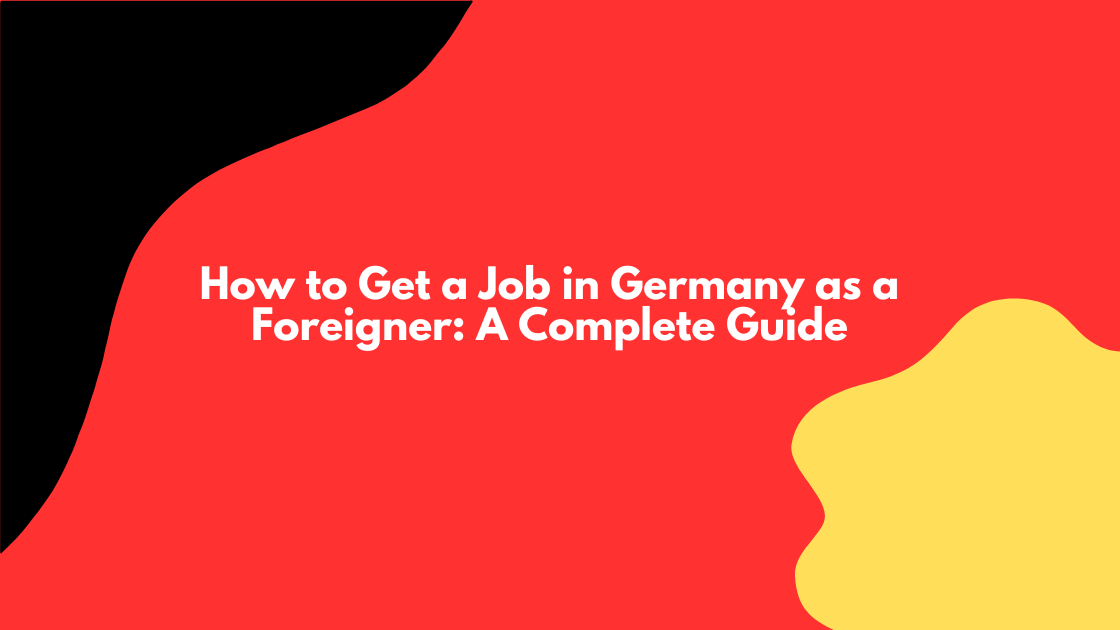How to Get a Job in Germany as a Foreigner: A Complete Guide
Germany is one of the best countries for foreign professionals seeking career opportunities in Europe. With a strong economy, high wages, and a shortage of skilled workers, Germany offers excellent prospects for international job seekers. If you are considering moving to Germany for work, this guide will walk you through everything you need to know about finding a job as a foreigner.
Why Work in Germany?
✅ Strong Economy – Germany has the largest economy in Europe and ranks among the top global economies.
✅ High Salaries – Competitive salaries and excellent employee benefits.
✅ Work-Life Balance – Regulated working hours, paid vacation, and job security.
✅ Visa Pathways – Various visa options for skilled professionals, graduates, and job seekers.
✅ Opportunities for Career Growth – Access to top companies, advanced industries, and innovation hubs.
Step 1: Check Job Market Trends & In-Demand Sectors
Germany has a demand for skilled professionals in the following industries:
- Engineering (Mechanical, Electrical, Civil, Automotive)
- Information Technology (IT) (Software Developers, Data Scientists, Cybersecurity Specialists)
- Healthcare (Doctors, Nurses, Medical Technicians)
- Finance & Banking (Accountants, Auditors, Financial Analysts)
- Hospitality & Tourism (Chefs, Hotel Managers, Restaurant Staff)
Research your industry to understand job requirements, salaries, and career prospects before applying.
Step 2: Meet the Eligibility Requirements
To work in Germany, you need to meet certain criteria:
- Recognized Qualifications – Your degree or vocational training must be recognized in Germany.
- Work Experience – At least 2-3 years of experience in your field is beneficial.
- Language Skills – While many jobs are available in English, knowing German (B1/B2 level) can improve job prospects.
- Financial Proof – If applying for a Job Seeker Visa, you need to show proof of funds.
Step 3: Apply for Jobs in Germany
You can find job opportunities on these platforms:
🖥️ Job Portals
- LinkedIn Germany
- StepStone
- Indeed Germany
- Make it in Germany (Official government website)
🏢 Company Websites
- Directly apply on German company websites in your industry.
💼 Recruitment Agencies
- Contact German recruitment agencies specializing in hiring foreign professionals.
Step 4: Tailor Your CV & Cover Letter
In Germany, resumes follow a specific format:
✅ Professional CV (Lebenslauf) – One to two pages, structured format, including a professional photo.
✅ Cover Letter (Anschreiben) – Personalized letter explaining why you are the right fit for the job.
✅ Certificates & References – Attach any relevant certificates, degrees, and letters of recommendation.
Use a German-style CV template to improve your chances of getting noticed by employers.
Step 5: Apply for a Work Visa or Job Seeker Visa
If you get a job offer, you can apply for a Work Visa. If you want to move to Germany to search for a job, apply for a Germany Job Seeker Visa, which allows you to stay for up to 6 months while looking for employment.
Types of German Work Visas:
- EU Blue Card – For highly qualified professionals earning €58,400+ per year.
- General Employment Visa – For skilled professionals with a job offer.
- Germany Job Seeker Visa – For professionals searching for a job in Germany.
Step 6: Prepare for the Interview
Once you start getting interview calls, prepare by:
✅ Researching the company – Learn about their work culture and values. ✅ Practicing common interview questions – Prepare answers related to your field. ✅ Improving your German language skills – Even if the job is in English, basic German knowledge helps. ✅ Understanding German Work Culture – Punctuality, professionalism, and direct communication are highly valued.
Step 7: Relocate to Germany & Start Working
Once your visa is approved:
🏠 Find Accommodation – Use websites like Immobilienscout24 and WG-Gesucht to rent an apartment.
📜 Register Your Address (Anmeldung) – Mandatory registration within 14 days of arrival.
🏦 Open a German Bank Account – Required for receiving your salary.
🚑 Get Health Insurance – Health insurance is compulsory in Germany.
Final Thoughts
Finding a job in Germany as a foreigner may seem challenging, but with the right approach, it is achievable. Germany welcomes skilled professionals, and by following this guide, you can successfully land a job and build a great career. If you need help with job applications, visa processing, or relocation, contact German Studio for expert guidance!
📩 Get in Touch Today!

